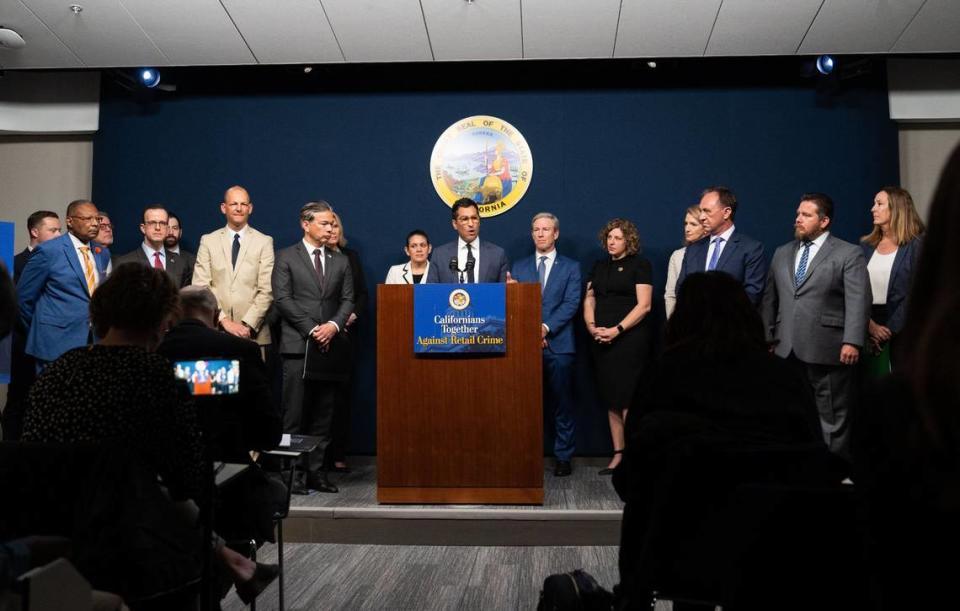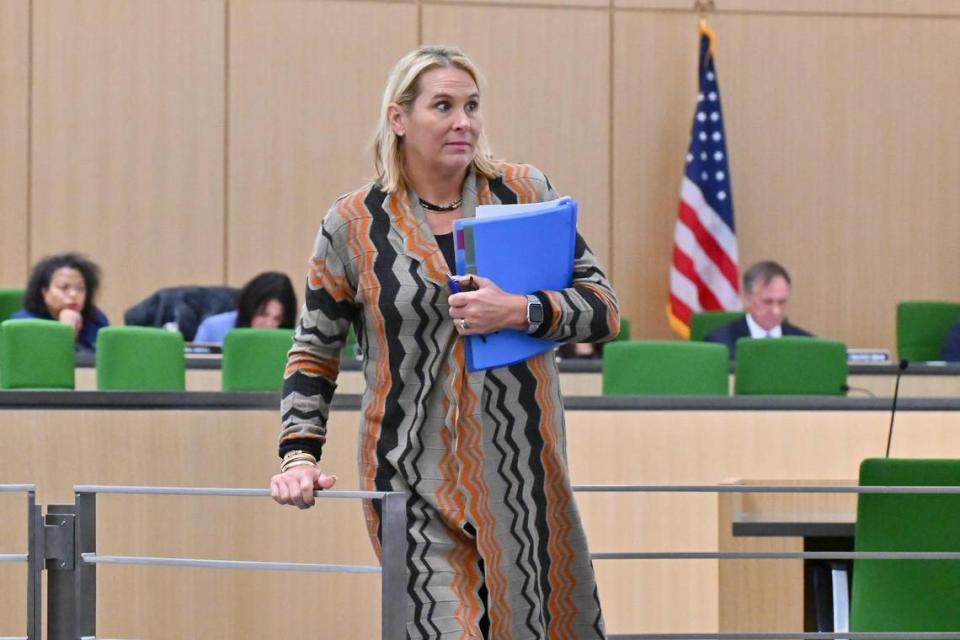California retail theft captured the Capitol’s attention. How major stores have lobbied for it
- Oops!Something went wrong.Please try again later.
National big box chains and the trade groups that represent them have dramatically increased spending on lobbying this year — and it appears as though it’s paying off.
Since the beginning of the year, Assembly Speaker Robert Rivas, D-Hollister, and Senate President Pro Tem Mike McGuire, D-Healdsburg, have both proposed multi-bill packages to address shoplifting and organized retail theft.
Rivas in October formed an Assembly Select Committee on Retail Theft. The concerted attention lawmakers are devoting to the topic is relatively new. There were far fewer legislative efforts to take on the topic in years past.
Rachel Michelin, CEO of the California Retailers Association, last week said during a Sacramento Press Club panel “this dynamic has changed in the Capitol in terms of having these conversations.”
The Retailers Association paid significantly more for lobbying year-over-year, spending about $70,391 during the first quarter of 2023 and about $577,682 during the first quarter of 2024, according to Secretary of State’s Office lobbying disclosures.
Most of that money, $500,000, went to a lobbying coalition pushing for changes to the Private Attorney General Act, or PAGA, which allows employees to file lawsuits seeking civil penalties for state Labor Code violations.
The remaining $77,682 went directly to in-house lobbyists or outside firms.
The Retailers Association did not make anyone available to answer Sacramento Bee questions from about lobbying efforts.
Michelin in her Press Club comments attributed the legislative changes to Rivas’ committee. But her own organization — as well as Target, Home Depot and other store chains — have been lobbying lawmakers and the governor at least since the time the speaker created it.
Retailers support bills making it easier for prosecutors to go after repeat thieves and those who take items from stores to resell them online, among other pieces of legislation.
While chains and trade groups are lobbying lawmakers, some of the same retailers have donated millions of dollars to back a ballot measure rolling back portions of Proposition 47. The voter-approved initiative made certain lower-level crimes — including shoplifting property under $950 — misdemeanors. Newsom, Rivas and McGuire have all said they are against changing Proposition 47.
Walmart had contributed $2.5 million to the initiative campaign, and Home Depot and Target had each contributed $1 million as of Friday, according to campaign finance filings from the Secretary of State’s Office.
Californians for Safer Communities last month announced it had collected more than 900,000 signatures to put the measure on the November ballot.
Retailer lobbying
Retail theft data does not paint a clear picture of whether the problem has increased significantly in recent years. Public Policy Institute of California data from 2022 indicated the rate of shoplifting incidents was 8% lower that year than it was prior to the COVID-19 pandemic.
The National Retail Federation’s 2023 security survey showed businesses’ nationwide shrink rate — losses caused by external theft, employee stealing and systemic errors — was 1.6% in 2022. It was up from 1.4% in 2021, but it was still “in line with shrink rates seen in 2020 and 2019.”
Even so, Walmart, Target and Home Depot all increased their year-over-year lobbying spending from the first quarter of 2023 to the first quarter of 2024, both of which started on Jan. 1 and ended on March 31.
All of the retailers specifically reported 2024 first quarter lobbying on retail theft, either as a general topic or in relation to specific bills on the issue, according to Secretary of State’s Office disclosure forms.
Collectively, the three retailers increased their lobbying spending by about 53% from the first quarter of 2023 to the first quarter of 2024.
Walmart spent about $82,518 during the first quarter of 2023 and $88,605 during the first quarter of 2024. Target spent $20,000 lobbying during the first quarter of 2023 and $32,000 during the first quarter of 2024.
Home Depot increased its lobbying budget the most, spending $33,000 during the first quarter of 2023 and about $87,000 during the first quarter of 2024.
A large chunk of the most recent Home Depot spending, $54,000, went to the California Retailers Association.
Evelyn Fornes, a Home Depot spokeswoman, said the retailer is pushing for enforcement of the Inform Consumers Act, a federal law that went into effect last year. It requires online platforms to verify and disclose information about their product sellers.
Fornes said Home Depot also wants to see Congress and state Legislatures do more around “creating capacity for law enforcement to investigate and prosecute cases through funding federal, state and local task forces” and educating law enforcement and prosecutors on how to partner with retailers to prevent theft.
Is lobbying effective?
Assembly Select Committee on Retail Theft chair Rick Chavez Zbur, D-West Hollywood, said lobbying efforts were not what prompted Rivas to create the committee. Zbur said he approached the speaker about organizing a more cohesive effort on retail theft after constituents asked him to address it.
The assemblyman then began reaching out to the Retailers Association, criminal justice reform groups and law enforcement organizations to learn more about the issue, he said.
After Rivas announced the committee, Zbur started hearing from more company lobbyists, he said, although the most substantial conversations occurred with the Retailers Association.
He said conversations with individual retailers’ lobbyists focused on issues they were seeing in stores, a lack of enforcement around theft crimes, difficulties with prosecution standards and Proposition 47 concerns.
Lobbyists knew Assembly members were putting together a package of bills on retail theft and wanted to provide input on the legislation they wanted included, Zbur said. One such measure was Assembly Bill 1779 from Assemblywoman Jacqui Irwin, D-Thousand Oaks, which would allow local prosecutors to charge related organized retail theft incidents in one county Superior Court filing.
The measures in Rivas’ bill package continue to move through the Capitol. Michelin of the Retailer’s Association told the Press Club her group will “see it to the finish line.”
“It’s not real until it’s signed by the governor,” she said.



